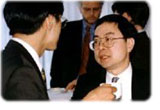How Do We Want to Live Tomorrow
Trilateral Agenda Brainstorming
Conference, March 23-24, 1998, CAP, Munich, Germany
Summary
Program
Participants
PDF-Download: Executive Summary.
|
How Do We Want to Live Tomorrow Trilateral Agenda Brainstorming Conference, March 23-24, 1998, CAP, Munich, Germany Summary Program Participants PDF-Download: Executive Summary. |
|||||
| |
Executive Summary An Intercontinental Look at the Future  Twenty-five
forward-looking thinkers convened in at the Center
for Applied Policy Research (CAP) in Munich to consider the question
of how we want to live tomorrow in an ininary and intercultural fashion.
Specifically, the conference discussed Twenty-five
forward-looking thinkers convened in at the Center
for Applied Policy Research (CAP) in Munich to consider the question
of how we want to live tomorrow in an ininary and intercultural fashion.
Specifically, the conference discussed
The approaches of our speakers continually reflected these emphases: Americans tended to talk about freedom, whether political or economic, and usually both. Europeans tended to discuss culture in the sense of communication among different groups, or as a continuity separate from the marketplace. They also gave the conference important reminders that societies take longer to change than businesses or economies. Among our Asian presenters, there was a strong emphasis on economic development, rising standards of living, and the effects of these trends. They tended to assume that social cohesion within a given country would persist and focus on the economic aspects of the future. Based on these existing norms, attitudes toward the future varied more within a given region than among the regions. In each area, many members of the population fear change - particularly globalizing change - as a concept, regardless of the actual impact it has had on their lives. Another sizable segment does not particularly welcome change, but recognizes the need to adapt. A smaller segment reacts to a changing world by fleeing into special interests and subcultures. Finally, a relatively small but growing segment actively welcomes globalizing change and works to take personal advantage of changing circumstances. How political and social conditions would adapt to these groupings was not yet clear, and the discussants posed provocative questions in this direction. Key questions for interpreting the future social and political directions of society will provide the Research Group on the Global Future part of its working agenda. From the conference, these include how globalization affects the balance among national, state or regional, and supra-national political arrangements; how key technologies, such as genetic engineering or computer networks, affect social organization; how increasing economic development and individualization will impact societies in Asia, and how that impact will affect world politics; how much concentrated technical, economic, and political change our existing structures can stand; and what bases new social, business and political relations will rest on. |
||||
Project Background | Events | Reports and Essays Zukunftszeugen | Contact Us | Home Page Last Modified: 2002-04-23 TOP |
|||||